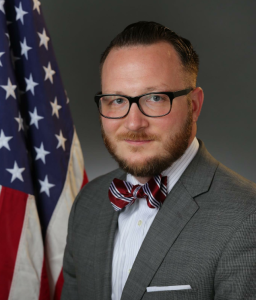 The following D.C. Update comes from our newest freelance contributor, Shaun Rieley.
The following D.C. Update comes from our newest freelance contributor, Shaun Rieley.
Last week was the U.S. House of Representatives’ final week before moving into the annual August recess, where lawmakers enjoy vacation, and return to their home districts – ostensibly to reconnect with their constituents. However, just before leaving, those of us whose job it is to pay attention to these things were treated to some fireworks on the House floor. Up for debate were two measure, both dealing with veterans’ issues. Both were controversial, for different reasons. The first was a measure called the VA Accountability Act. Effectively, this piece of legislation would expand the authority of the Secretary of Veterans Affairs to remove problematic employees of VA, by cutting through much of the red tape currently associated with removing government employees. A similar measure was passed last year by large bipartisan margins in the wake of several VA scandal which resulted in the resignation of VA secretary Eric Shinseki. That measure, however, only applied to the Senior Executive Service (SES). This bill would apply to the entire VA workforce. The bill was supported by nearly every major veteran’s organization, including The American Legion, the VFW, Paralyzed Veterans of America, Iraq and Afghanistan Veterans of America, Concerned Veterans for America, AmVets, and more. Predictably, the bill has been vigorously opposed by the American Federation of Government Workers (AFGE), that is, the government employee union. They lobbied Congress, causing the bill to be reported out of committee on a straight party-line vote – a rare occurrence in the typically bipartisan House Veterans Affairs Committee. The measure then proceeded to the floor, where it passed, garnering only sixteen Democratic votes.
Clearly, union interests trump nearly every other interest for most Democrats, even when we are talking about veteran groups’ opinions about the proper way to hold VA accountable.
A companion measure has also been reported out of committee in the Senate, and is expected to be voted on in the fall. President Obama has threatened to veto the bill if it passes through Congress, however.
The second bill was a VA funding measure that shifted nearly $3.4 billion in order to cover an impending VA budget shortfall that VA stated would shut down VA hospitals and otherwise impact VA care if it were not authorized. The funds were pulled from the funds appropriated for the Choice Program, which allows veterans who are further than 40 miles from a VA facility, or who have difficulty obtaining an appointment, to move outside of the VA system and obtain care in the private sector.
The bill was somewhat controversial, but not because it funded VA – virtually no one believed that VA should go unfunded and be allowed to close needed medical facilities. The controversy resulted from the source of the funds, and the fact that VA concealed the shortfall from Congress until approximately one month before action was required. Since the implementation of the Choice Program last November, VA has been seeking a way to divert the funds that were allocated for the program. On no less than three occasions the undersecretary of VA Sloan Gibson has testified before congress requesting that the funds be allowed to be reallocated for various reasons. This is largely because VA does not like veterans leaving their system to receive care, even if outside care is better and/or more convenient for the veteran. Essentially, for all the good that VA admittedly does, it has, in many ways, become a system more interested in sustaining itself than it is in serving those it exists to serve. VA also suffers from severe mismanagement, and this issue is further demonstrates that fact. House VA Committee Chairman Jeff Miller (R-FL), in response to the budget shortfall that it “proves to me once again that VA’s current problems reflect a management issue far more than they represent a money issue.” Nevertheless, the funding was approved, passing both the House and Senate on the back of a three month extension of the highway bill. The Senate will finish its business this week, and will go into recess for the remainder of August.


I have become extremely frustrated with the VA, and the many problems surrounding the health care our veterans receive. The lack of staffing at the VA Clinic in Georgetown has forced many in Sussex to travel to the Elsmere facility. What’s troubling about this, besides the veteran losing much needed medical services, is that the VA continues to refuse to educate the veterans of the Fee Basis Program. If they were to educate and inform the veteran of the program he or she would be able to use a medical facility much closer to their home. Stories of local veterans having to drive the two hour drive to the hospital for specialized treatment are not uncommon and are unacceptable. I’ve known a few who have had Stage IV cancer and have driven themselves so they could receive needed chemotherapy. Combat veterans who suffer from PTSD, anxiety, or other mental illness are less likely to make the drive up to Wilmington and this also is unacceptable, especially when we are losing twenty- two veterans a day to suicide. This wouldn’t even be an issue if the clinic in Georgetown could keep staff levels where they need to be. They just recently lost a psychiatrist, who left the VA after only six months of employment. Recently, I’ve taken veterans to the Elsmere facility only to have the veterans told when they check in for their appointment that their appointment has been cancelled. Cancelled without any notice at all to the veteran. Three weeks ago everyone I took up there had their appointments cancelled with no notice. The VA Health Care System is failing our men and women who served their country and something must be done, although I serious have my doubts that anything will change. Thank you Shaun for this informative contribution.
Mike, I 100% agree with you. I have a grandfather who does suffer from PTSD. He won’t go on planes anymore, he doesn’t like large crowds, and he doesn’t like to travel period! That being said, last year he was twice told to go to Elsmere and Georgetown couldn’t take care of his issue. He isn’t even bothering to see the psychologist cause he can barely get an eye infection or skin rash looked at! Bottom line the Delaware VA is a joke for anyone below the canal but were Sussex and we don’t matter!
Clearly all the arguments above are against smaller government. We hear: ”we need smaller government”… But when we get it, we complain? What’s up with that?
The obvious answer is to spend more on our veterans. Obvious answer. But where do we get the money? How about taking just a little from the $2 trillion of profits earned every 65 workdays?
If we taxed fairly, which means those with lots of money pay higher rates of taxes… that is very fair, then we could actually fix the VA into a model medical agency. But when we give billionaires tax cuts, like the $490 billion one recently passed along party lines in both houses, we have to make those cuts from somewhere… Veterans get less service when they deserve to get more…
Instead of b/tching and moaning about any government agency’s lack of service, spend that energy writing to your Congressmen, literally begging him to raise taxes on the top 1%, ….
kavips,
If Mr. Rieley, the American Legion and “conservatives” in general really cared they would write their Congressmen begging them to defund the wars, so there would no need for PTSD treatment in the first place.